Israel has long been a top travel destination, welcoming more than 4 million tourists in 2018, and over 2.2 million in the first half of this year alone. According to the Israeli Ministry of Tourism, the country is hosting tourists and travelers in record numbers that continue to rise annually.
Israel offers historic sites, colorful markets, breath-taking desert scenery, picture-perfect beaches, great museums, and, of course, an unforgettable culinary scene. It also offers steep prices, especially in the always sunny and vibrant “Nonstop City,” Tel Aviv.
From dining to lodging, when planning a trip to Israel on a budget, many travelers soon realize: It’s complicated. After all, Tel Aviv ranks 10th most expensive city in the world, according to the Economist 2019 “Worldwide Cost of Living Survey.”
SEE ALSO: Travel Tips: A Definitive List Of Must-Have Apps for Visitors To Israel
Although the country aims to attract more tourists in the future – over 10 million a year in the long-term, according to the President of the Israel Hotel Association – local authorities show no real intention of planning to provide an array of accommodation options. The recently announced “Tel Aviv-Jaffa 2030” master plan for increasing tourism includes doubling the number of the currently 10,500 hotel rooms in the city over the next decade.

Yet, statistics show that tourists today have different preferences. When choosing their accommodation in Israel, incoming tourists opt less for pricey hotels and more for, often unregulated, short-term rentals. Although entries to Israel rose about 14 percent in 2018 (January to November), foreign tourist overnights only increased by nine percent.
But heads up to everyone hoping for a bargain on Airbnb. According to the Bloomberg index 2018, Tel Aviv and Jerusalem are among the 10 most expensive cities in the world in which to rent an Airbnb apartment.
So is the journey over before it’s even begun? It doesn’t have to be. There are increasingly some interesting and innovative lodging options across the country.
Here, NoCamels highlights a few beacons of hope for the budget-minded traveler to Israel.
WOM
Over 150 compact and affordable rooms are about to be ready for guests in two locations in Tel Aviv this summer and fall. WOM (Word of Mouth), a new “pod hotel” brand is set to be launched by the Israeli boutique hotel group Brown Hotels. The first location with 40 rooms opens on August 15 on Allenby Street. In autumn, a second 140 room-WOM in Neve Tzedek is about to follow.
When booking a pod, forget everything you know about a real hotel experience. Here, it’s all about stylish simplicity.
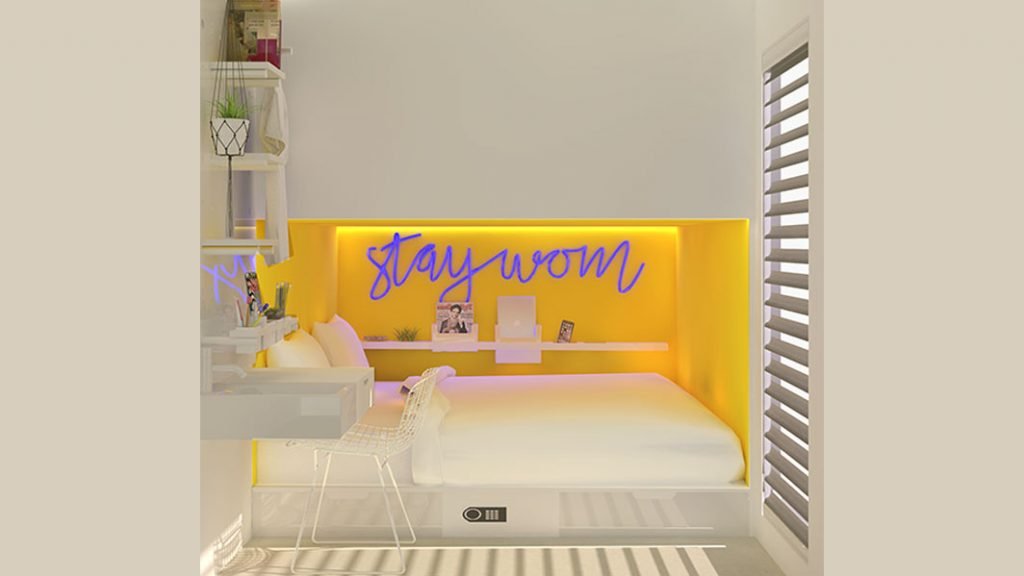
Starting at $50 per night, a 2×2 meter single pod includes a bed, a wardrobe and a work desk. Double and king pods are slightly larger, but the bathrooms are shared between four units. But don’t be afraid to stand in line. The WOM app will not only tell you if your bathroom is free, it also takes care of your check-in and check-out, controls lighting, sound, wifi, and even the TV. It also allows you to book city tours or communicate with staff.

WOM Allenby will be located under the new Lighthouse Hotel by Brown Hotels and WOM guests will be able to use the hotel’s facilities including the fifth-floor restaurant, according to Hospitality Net.
Brown Hotels has indicated that it plans to develop the brand in Israel and in Europe.
Spot Hostel
Although pod hostels have already become a standard in many major cities across the world, the trend came to Tel Aviv only in April 2019. Spot Hostel at the Tel Aviv Port was the city’s low-cost pioneer.
With 90 rooms, the hostel claims it has “a spot” for everyone. Guests can choose between dorms, tents, private rooms, mini-apartments and pods for one or two people.
While private space is limited, there is plenty of room for communal experiences. The hostel comes with a coworking space, a bar, a screening room and an outdoor deck overlooking the Yarkon river.
The most affordable options start from $20 for an indoor tent, $25 for a dorm room and $45 for a pod.
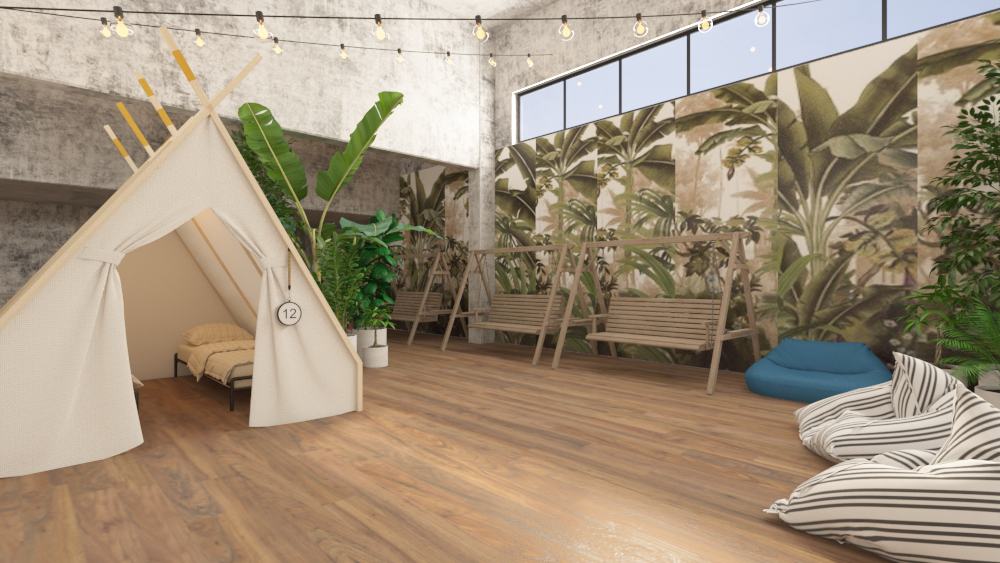
On top of that, the location by the sea, close to the popular Hilton beach and the city center, is priceless. “We say spend the money on your trip, not on your room,” Naama Shviki, Spot Hostel’s marketing and sales manager, told The Times of Israel.
The hostel is owned by Shlomo Elia and Rami Ohana, who also co-owns the Post Hostel in Jerusalem.
The Post Hostel Jerusalem
The Post Hostel was built into the top floor of the historic Central Post Office of Jerusalem, a British Mandate-era building on Jaffa Road, catering to travelers of all backgrounds. It first opened its doors in 2015.
The hostel bills itself as offering “an eclectic and contemporary blend of design, culture, people and experiences, attracting a wide range of travelers from all corners of the world.”
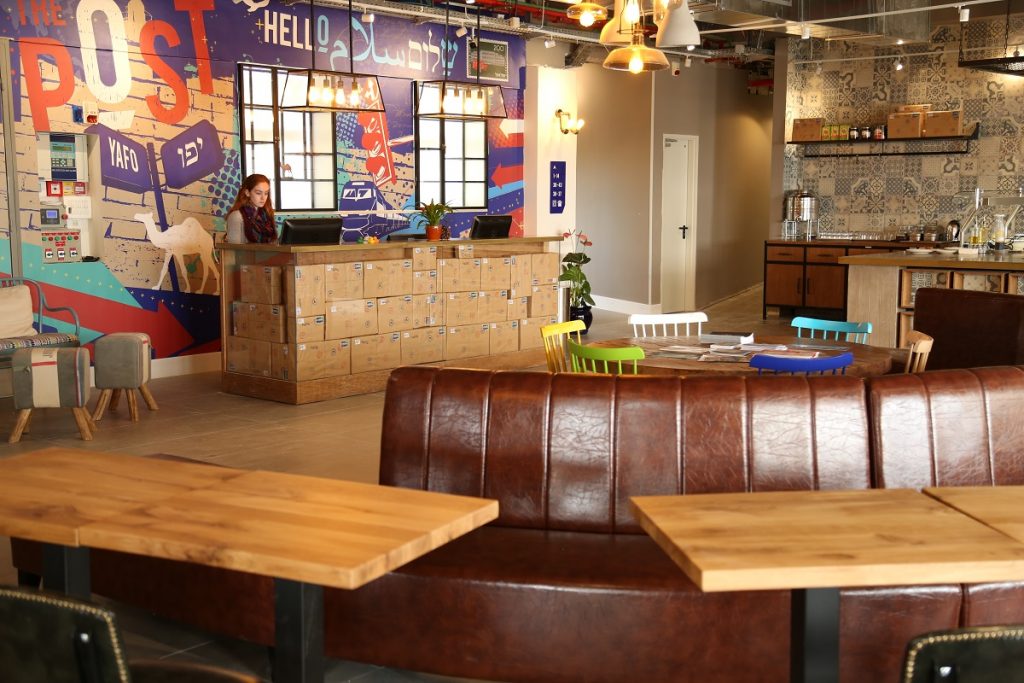
The Post Hostel organizes daily tours of Jerusalem for guests and offers free WIFI, Israeli breakfast, lockers, linens, and luggage storage. There’s also a shared kitchen, a bar, and a rooftop terrace for shmoozing, and a rec room for in-house entertainment.
The hostel has 40 rooms, including dorms that accommodate up to 12 people and private rooms for families or those who just want privacy.
A private room with a double-bed costs about $100 for a one-night stay in August.
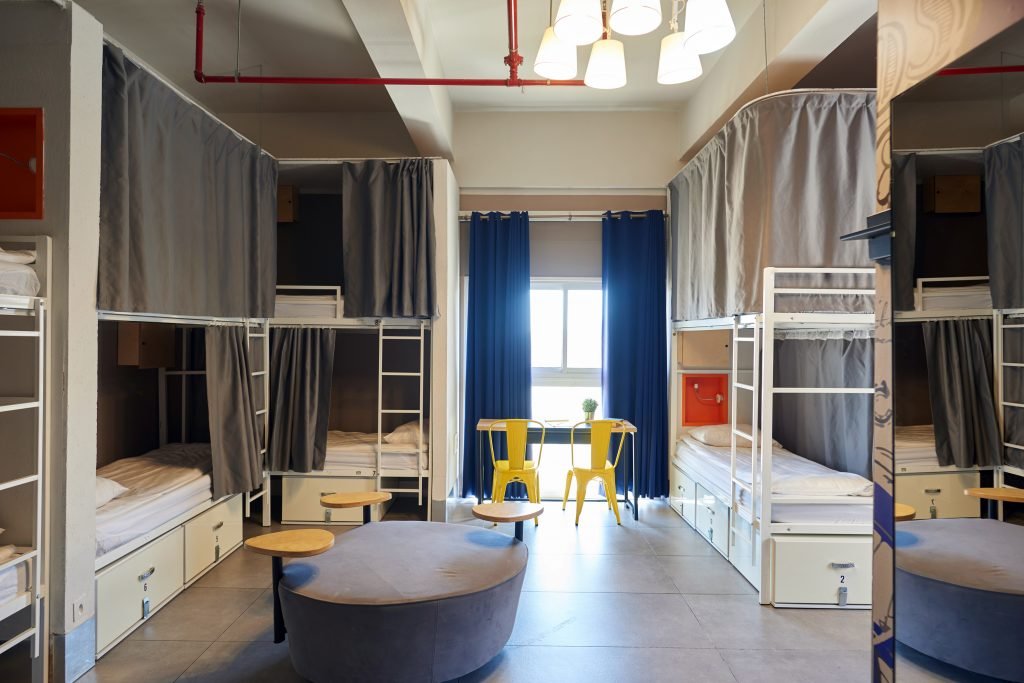
Capsule Inn
Those who live according to the motto “a bed is all I need” will find just that in the Capsule Inn, right in the heart of Jerusalem on Jaffa Road. It aims to be an “alternative to the bunk beds with little privacy in hostels,” providing guests a closable capsule to sleep in.
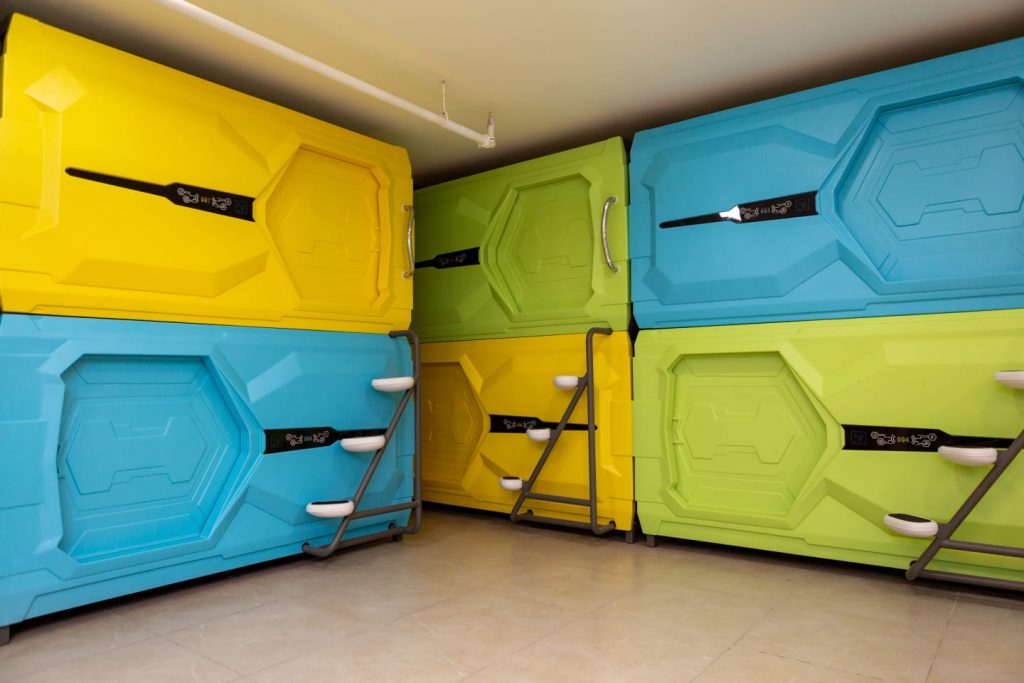
What resembles a giant freezer, in fact, includes a bed, a TV, and free wifi. A night in a two cubic meter single capsule costs 99 NIS ($28), a double capsule is available for 179 NIS ($50).
Sign up for our free weekly newsletter
SubscribeThe hostel, which opened its doors in May 2019, fits 18 such cubes in one large space.

The hostel says it was “born out of the need for affordable accommodation in the heart of Jerusalem city center.”
In addition to the capsules, the hostel offers a shared kitchen and shared bathrooms and showers.
Cinema Hostel
Calling all cinema fans. The Cinema Hostel in Jerusalem takes guests to the frontlines of Israeli culture in the 1940s through the 1970s with some of the most affordable and unique accommodation in the city.
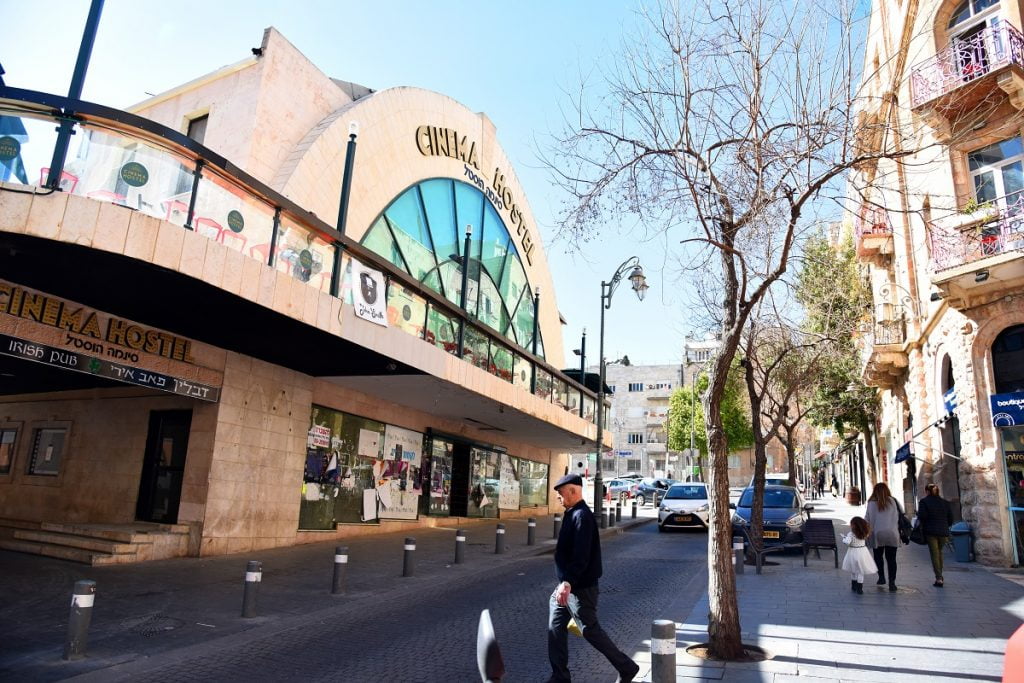
Established in 2018 by entrepreneurs Adir Amsalem and Michael Perelshtein, the hostel brought the old Orion Cinema building in the city back to life, 25 years after it closed down. For some 40 years, the cinema was known for screening classic, controversial and independent films. And much of the hostel’s decor is inspired by the cinema scene in those years.
Each space is dedicated to different movie themes, and the hostel’s cocktail bar features 1920s decor. The hostel also screens movies every night as well as hosts social activities for guests such as yoga sessions, music jams, and Shabbat dinner.
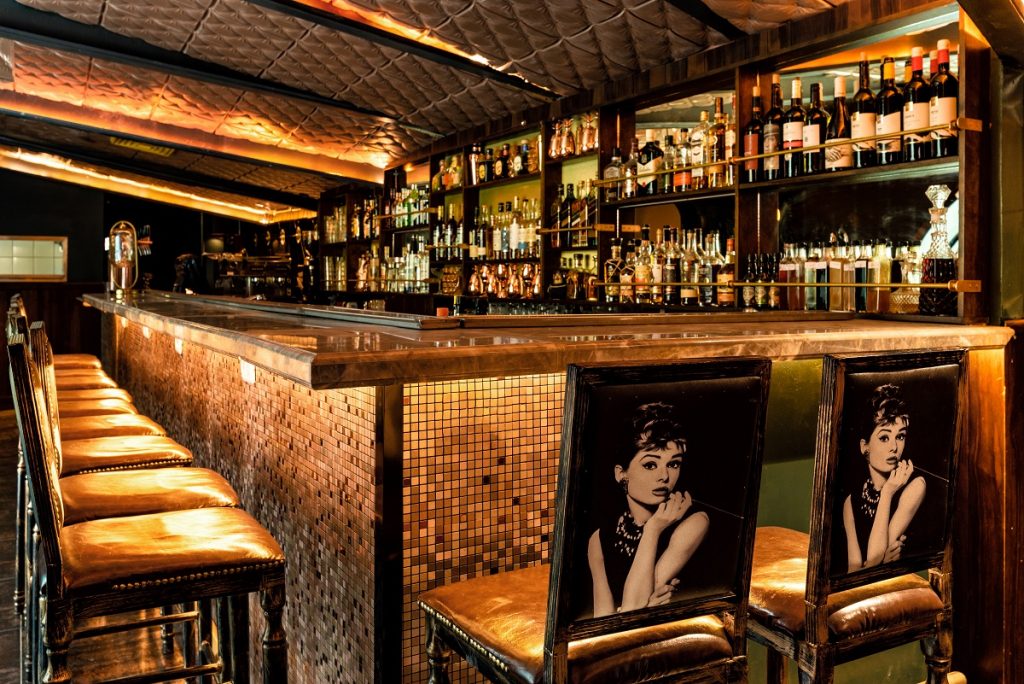
Located in the triangle between Jaffa Road, King George Street, and Ben Yehuda, a wide-open terrace is overlooking the city center.
Guests can choose between double rooms and multi-bed dorms, which start at $14.50 per night. According to the hostel, different capsule options will be available starting this summer.
Caravan Hostel By Roger
Tel Aviv is always good for an adventure – but camping in the middle of the city takes this experience to a new level. Based in a private parking zone in Tel Aviv’s swanky Neve Tzedek neighborhood, the Caravan Hostel by Roger (part of Roger’s House Tel Aviv) offers guests unique outdoor accommodation just a few minutes walk away from the beach and the city’s cool Florentin area.
For around $50 a night, guests can call a stylish caravan, a camper or a trailer, their mobile vacation home. Those who don’t quite identify with the outdoor lifestyle, but still want to experience the atmosphere, can stay in one of the dorm rooms located in the hostel’s main building, where prices range between $15 and $20.
Roger’s House also serves its own craft beer called Birra Roger (“birra” means beer in Hebrew).
LINK Hotel & Hub
The LINK Hotel & Hub may not offer $50 rates, but it is still relatively affordable. And it has a few legit cool factors.
The LINK hotel, owned by the Dan Hotels chain of Israeli luxury hotels, opened its door in July 2018, catering to the needs of the millennial tourist and modern business traveler. Located on King Saul Avenue, and walking distance from a major train stop as well as the Tel Aviv Museum of Art, the LINK aims to combine an innovative hotel experience with urban culture.
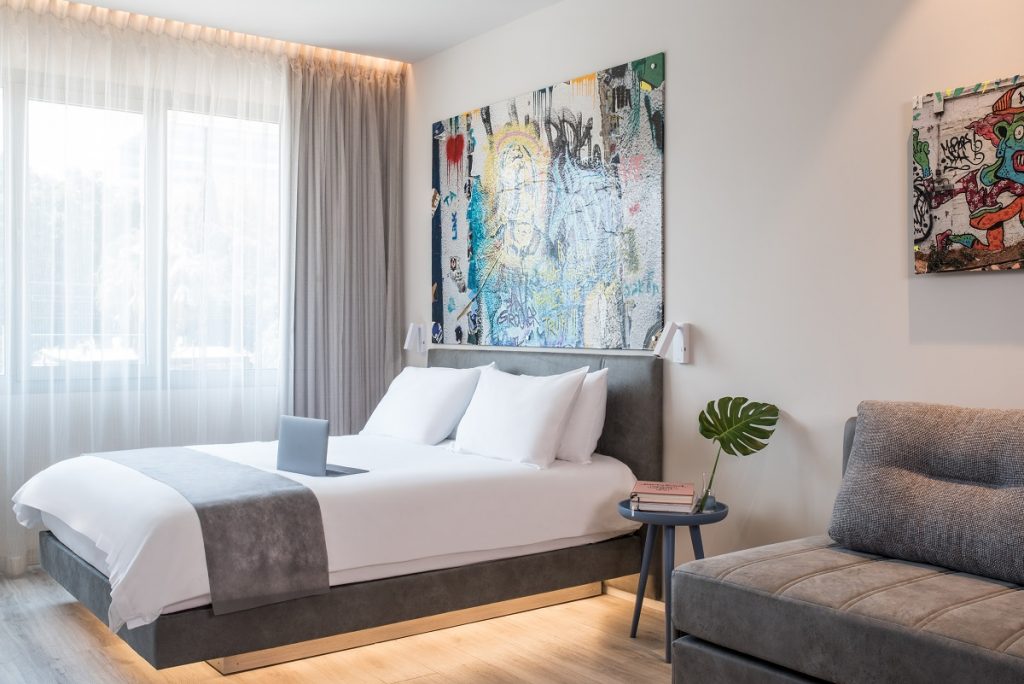
At the LINK there is no reception desk. Guests check in and out by themselves using the LINKapp, a mobile platform that also serves a virtual concierge to explore the city. But hotel guests don’t have to miss out on the social factor. At the LINK’s hub floor, guests can use coworking spaces and private meeting rooms, hang out with other guests while eating, drinking and playing games or relax by themselves but in the company of others.
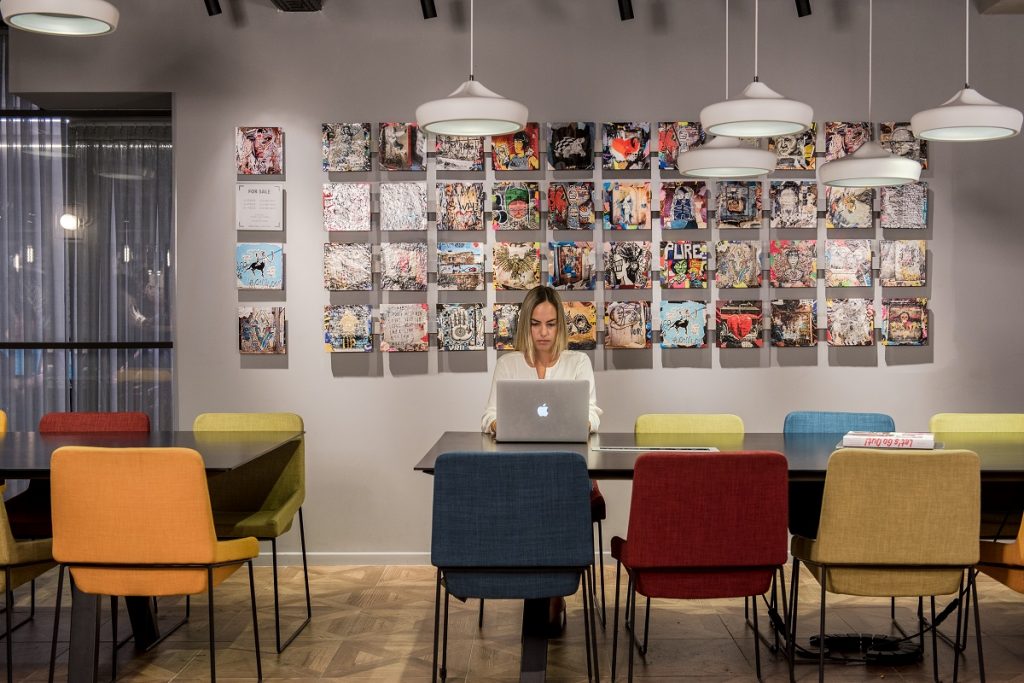
The hotel’s entire design was inspired by Tel Aviv’s urban culture and features original artwork curated by award-winning French photographer and artist Daniel Siboni. Much like a gallery, each of the ten hotel floors is dedicated to a different local street artist. The pieces are all for sale via the app.
SEE ALSO: Artsy, App-Run Tel Aviv Hotel Named Among World’s ‘100 Most Incredible’
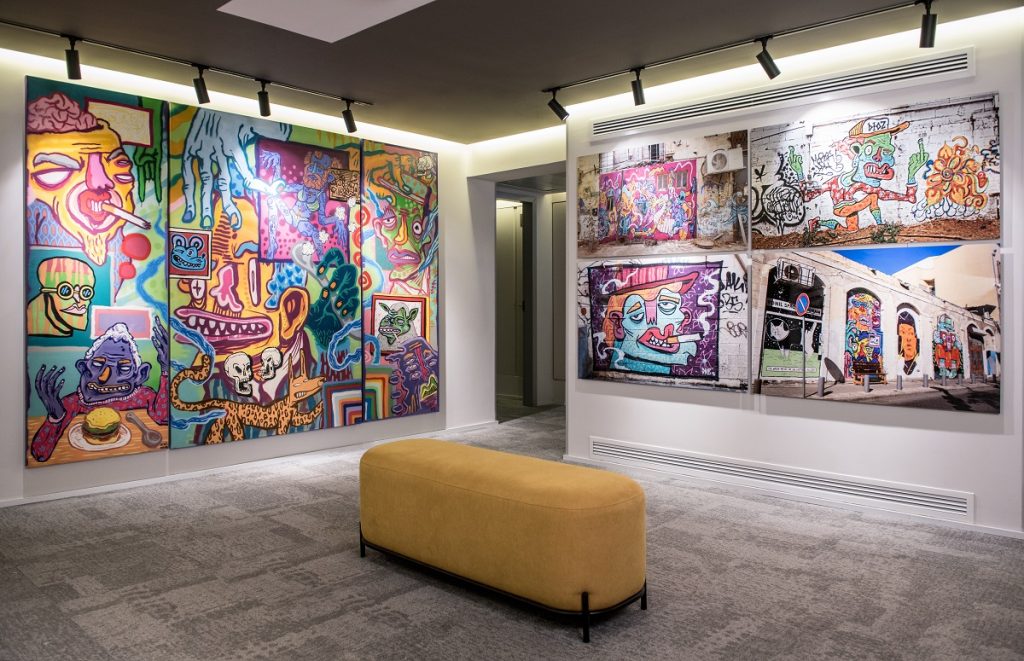
“We’ve eliminated many procedures typical of traditional hotels: there are no cash transactions, our service crew is comprised of over 50 spoken languages and operates on a 24/7 basis where everyone does everything,” said Ron Federmann, head of development at LINK hotel & hub, in a recent press release. “Through the LINKapp, we’re aiming to offer guests a new way to connect with the physical service of the hotel and the city.”
Queen-sized rooms are available for around $150, even mid-summer.
CityTree
A place with a truly unique local experience can be found in Tel Aviv’s Bialik Square. CityTree functions as an eco-home, commune, budding business, ecology school, almost-hostel, and a type of community center for environmental activists all around the world. The apartment works demonstratively as a representation of what green and community living can look like in an urban location.
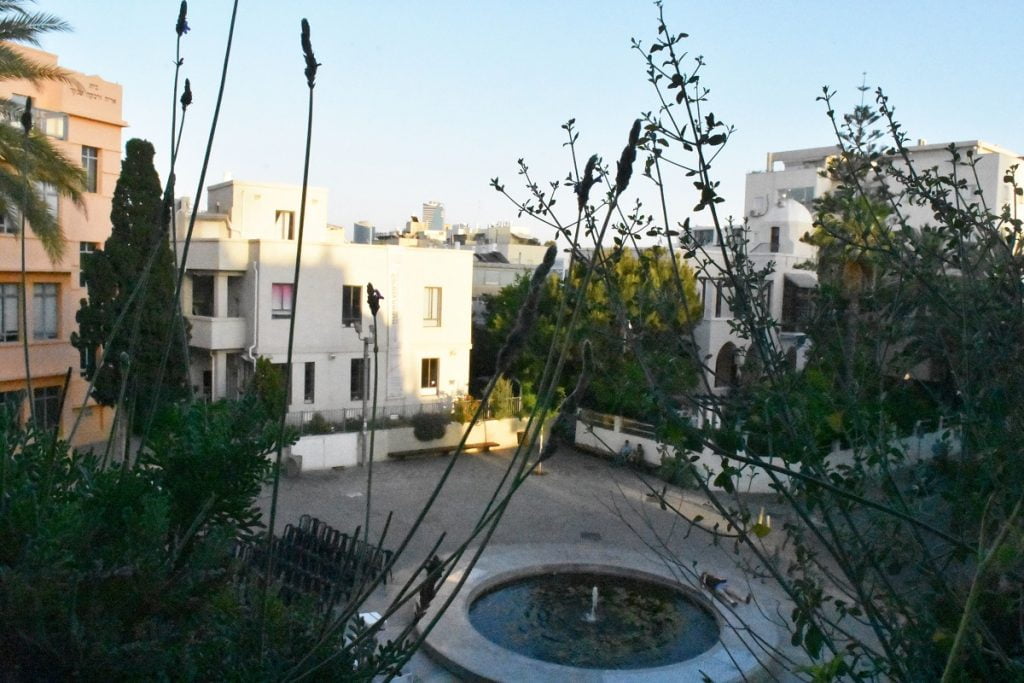
Through a myriad of different workshops, events, and retreats, CityTree invites strangers and friends alike.
SEE ALSO: CityTree, Tel Aviv’s Only Eco-Home, Is A Symbol Of Green, Communal Living
Staying at CityTree means no personal bedroom, as each room belongs to everyone equally. There are no bed frames in the house, but instead Japanese mattresses that function by day as small sofas for anyone to sit on, and at night are pulled out to become beds. The lack of air conditioning means open windows and mosquito nets every night. Unhealthy snacks and frozen grocery-store meals become a thing of the past for residents since CityTree also does not allow industrialized food in the house.
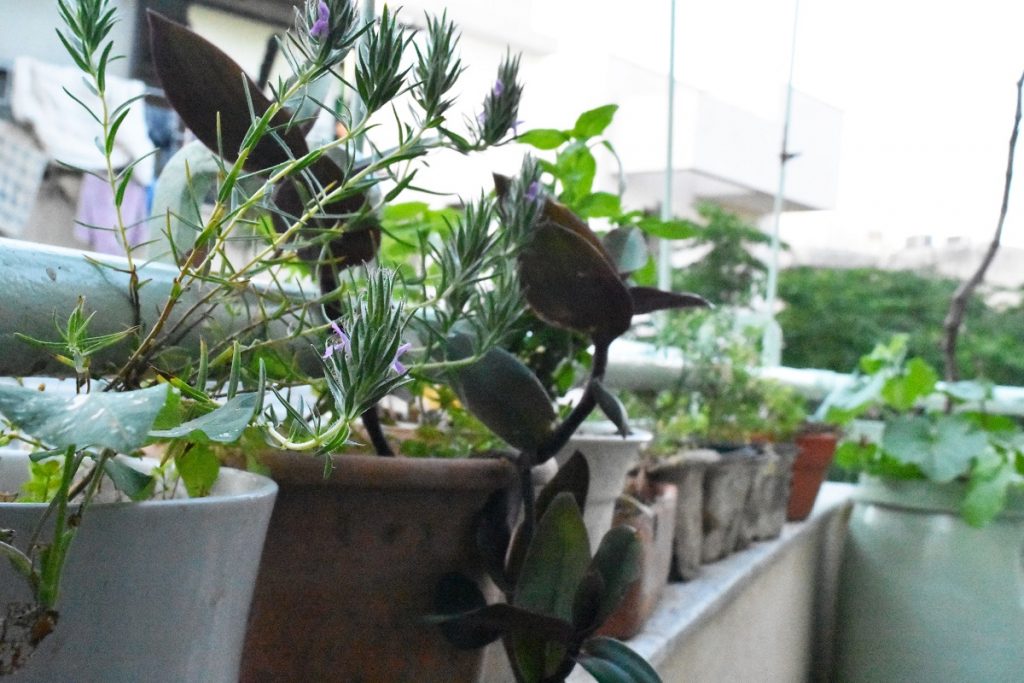
The people who work at CityTree maintain the commune, doing everything from cleaning the kitchen to organizing workshops to spending hours outside in the community garden. They also make sure the kitchen is constantly stocked with local, fresh vegan food that’s available to anyone residing there.
CityTree remains the only environmental commune in Tel Aviv, a model on how to live sustainably and self-sufficiently in an urban landscape.
Anjali Berdia contributed to this report.
Related posts

Rehabilitation Nation: Israeli Innovation On Road To Healing

Israeli High-Tech Sector 'Still Good' Despite Year Of War





Facebook comments